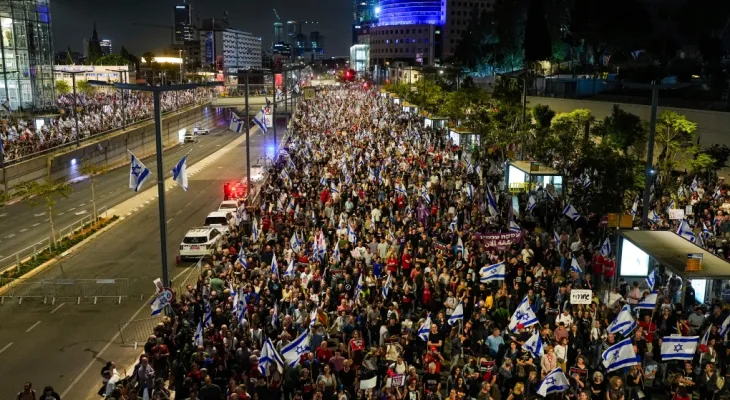Search here
Newspaper
Search here

Arab Canada News
News

Published: April 28, 2024
The White House said on Sunday that President Joe Biden spoke again with Israeli Prime Minister Benjamin Netanyahu as pressure mounts on Israel and Hamas to reach an agreement that would secure the release of some Israeli hostages and achieve a ceasefire in the war that has been ongoing for nearly seven months in Gaza.
No immediate details were provided about the conversation, which took place as Israel vowed to invade the city of Rafah in the extreme south of the Gaza Strip despite global concern over more than a million Palestinians sheltering there, and the return of the U.S. Secretary of State to the Middle East on Monday.
Meanwhile, a senior official from the main mediator Qatar urged Israel and Hamas to show "more commitment and seriousness" in the negotiations. Qatar, which hosts Hamas's headquarters in Doha, has played an active role alongside the United States and Egypt in helping to negotiate a short ceasefire in November that led to the release of dozens of hostages. But in a sign of frustration, Qatar said this month it is reassessing its role.
An Israeli delegation is expected to arrive in Egypt in the coming days to discuss the latest proposals in the negotiations, and Hamas senior official Bassem Naeem said in a message to the Associated Press that a delegation from the armed group will also head to Cairo. The state-owned Cairo television reported that the delegation will arrive on Monday.
The statements of the Qatari Foreign Ministry spokesperson Majid Al-Ansari were published in interviews with the liberal Haaretz daily and Kan public radio on Saturday evening.
Al-Ansari expressed his disappointment with both Hamas and Israel, saying that each side made its decisions based on political interests rather than considering the welfare of civilians. He did not disclose details regarding the talks, only stating that they had "effectively stalled" and that "both sides are sticking to their positions."
Al-Ansari's statements came after an Egyptian delegation discussed with Israeli officials a "new vision" for a long-term ceasefire in Gaza, according to an Egyptian official who spoke on condition of anonymity to discuss developments freely.
The Egyptian official said that Israeli officials are open to discussing reaching a permanent ceasefire in Gaza as part of the second phase of the deal. Israel has rejected ending the war until Hamas is defeated.
The official added that the second phase will begin after the release of civilian and sick hostages and will include negotiations for the release of soldiers. There will be the release of senior Palestinian prisoners and the commencement of the reconstruction process.
The negotiations earlier this month focused on a proposal for a six-week ceasefire and the release of 40 civilian and sick hostages held by Hamas in exchange for the release of hundreds of Palestinian prisoners in Israeli jails.
A letter written by Biden and 17 other world leaders urged Hamas to release the hostages immediately. Hamas has recently posted new videos of three hostages, in a clear attempt to persuade Israel to make concessions.
The increasing pressure on Hamas and Israel to reach a ceasefire agreement is also aimed at avoiding an Israeli assault on Rafah, the city on the border with Egypt where more than half of Gaza's 2.3 million residents are seeking shelter.
Israel has mobilized dozens of tanks and armored vehicles. The planned incursion has triggered a global alarm.
Palestinian President Mahmoud Abbas confirmed during the opening session of the World Economic Forum in Saudi Arabia that "all it takes is just a small strike to force everyone to leave Palestine," adding that he believes the invasion will happen within days.
But White House National Security Spokesperson John Kirby told ABC News that Israel "has assured us that they will not enter Rafah until we have the chance to share our views and concerns with them. So, we will see where that goes."
Enhancing Israeli forces may serve as a pressure tactic on Hamas in the talks. Israel considers Rafah to be Hamas's last major stronghold and is committed to destroying the military and governmental capabilities of the group.
Relief groups have warned that an invasion of Rafah could exacerbate the already desperate humanitarian situation in Gaza, where hunger is widespread. About 400 tons of aid arrived on Sunday at the Israeli port of Ashdod, the largest shipment yet across the sea from Cyprus, the UAE announced. It was not immediately clear how and when it would be delivered to Gaza.
On Sunday, the Global Central Kitchen also announced it would resume operations in Gaza on Monday, ending a four-week suspension after Israeli military drones killed seven of its relief workers. The statement indicated that the organization has 276 trucks ready to enter through the Rafah crossing and will also send trucks to Gaza from Jordan. It is also considering the possibility of using the Ashdod port to offload supplies.
The war erupted due to Hamas's attack on southern Israel on October 7, which resulted in the deaths of 1,200 people, most of them civilians, according to Israeli authorities, who say another 250 people were taken hostage. The Israeli authorities claim that Hamas and other groups are holding approximately 130 individuals, including the remains of about 30 people.
The retaliatory attack launched by Israel on Hamas has led to the deaths of more than 34,000 people, mostly women and children, according to health authorities in Gaza, which do not distinguish between civilians and combatants in their statistics.
The Israeli military holds Hamas responsible for civilian casualties, accusing it of operating in residential and public areas. It claims to have killed at least 12,000 militants without providing evidence.
Comments